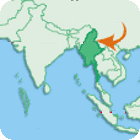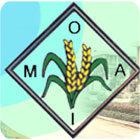Plant breeding programs in Myanmar
 The Union of Myanmar is the poorest nation in Asia in terms of GDP per capita. As a predominantly rural country, however, Myanmar is self-sufficient in food. Agriculture therefore plays a strong role in the nation’s future development planning. The principal exports are hardwoods and rice. Myanmar accounts for roughly three-quarters of the world’s teak exports. Other important crops are maize, peanuts, beans, oilseeds, and sugarcane.
The Union of Myanmar is the poorest nation in Asia in terms of GDP per capita. As a predominantly rural country, however, Myanmar is self-sufficient in food. Agriculture therefore plays a strong role in the nation’s future development planning. The principal exports are hardwoods and rice. Myanmar accounts for roughly three-quarters of the world’s teak exports. Other important crops are maize, peanuts, beans, oilseeds, and sugarcane.
The agricultural research activities were initiated in Myanmar soon after the Department of Agriculture (DA) was founded in 1906. The Department of Agricultural Research Institute (DARI) is the only plant breeding centre and manages breeding of all the major crops grown in the country. Private sector involvement in agricultural R&D in Myanmar is minimal. It is completely absent in plant breeding and in the seed industry.
Various plant breeding activities take place for a range of crops, including crossing, selection in segregating populations, evaluating fixed lines and evaluating lines introduced from elsewhere. The main crops concerned by these activities are rice, maize, wheat, groundnut, sesame and sunflower. Most crop improvement programmes rely on germplasm from international genebanks and germplasm networks such as IRRI, CIMMYT, ICRISAT and AVRDC.
The most limiting factors for the success of the breeding programs are the inadequate number of breeders for each crop and an inadequate knowledge of general plant breeding strategies. These deficiencies are the consequences, amongst others, of having only one agricultural university in the country.
Research and education institutes with activities in plant breeding
 |
Department of Agricultural Research Institute (DARI)
|
||||||||||||||||||||||||||||||||||||
 |
Yezin Agricultural University (YAU)
|
||||||||||||||||||||||||||||||||||||
 |
Seed Bank in Myanmar
|
| Crop |
Collected samples |
Short term (10˚C) | Medium term(-5˚C) |
| Rice | 7595 | 6302 | 6250 |
| Willd Rice |
317 | 141 | 141 |
| Cereal crops |
2434 | 2079 | 1945 |
| Food legumes |
1914 | 906 |
896 |
| Oil seed crops |
1246 | 638 |
631 |
| Industrial crops |
320 | 42 |
42 |
| Horticulture | 667 | - |
- |
| TOTAL | 14493 | 10108 | 9905 |
__________________________________________________
Information by Khin Than Nwe (2004) - Information based on the Myanmar's full report from the PBBC survey. Last revised, 15-03-10, GIPB.
